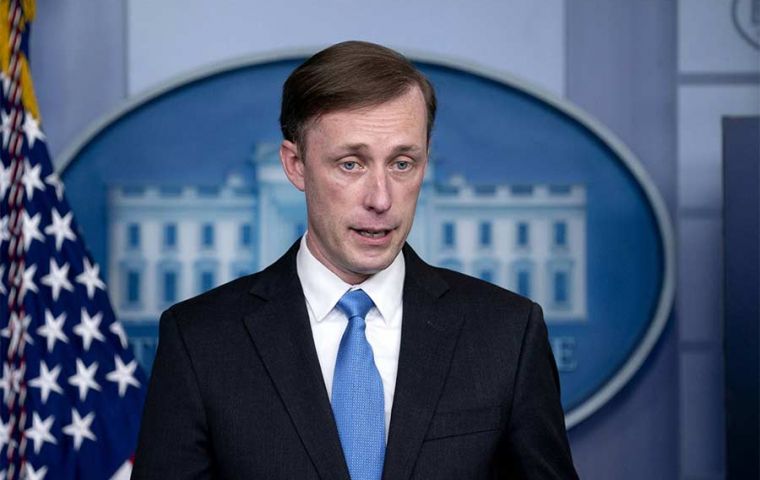MercoPress. South Atlantic News Agency
Russia-Nato war over Ukraine remains a distant possibility
 On February 6 Jake Sullivan, national security adviser said, “We believe there is a distinct possibility that Vladimir Putin will order an attack on Ukraine....
On February 6 Jake Sullivan, national security adviser said, “We believe there is a distinct possibility that Vladimir Putin will order an attack on Ukraine....  Ukrainian President Volodymyr Zelensky, responding to a warning by NATO said “I don’t consider the situation now more tense than before.”
Ukrainian President Volodymyr Zelensky, responding to a warning by NATO said “I don’t consider the situation now more tense than before.”  But how could all those expensive American (and British) intelligence agencies get things so wrong? Well, they got Iraq’s alleged ‘weapons of mass destruction’ wrong in 2003, didn’t they?
But how could all those expensive American (and British) intelligence agencies get things so wrong? Well, they got Iraq’s alleged ‘weapons of mass destruction’ wrong in 2003, didn’t they? By Gwynne Dyer - On January 18 US secretary of state Antony Blinken said that “our assessment has been that (a Russian invasion of Ukraine) could happen any time between mid-January and mid-February”.
On January 28 US deputy secretary of state Wendy Sherman said the United States sees “every indication that [Russian President Vladimir Putin] is going to use military force sometime perhaps between now and the middle of February”.
And on February 6 Jake Sullivan, national security adviser to President Biden, told ABC’s This Week: “We believe there is a distinct possibility that Vladimir Putin will order an attack on Ukraine....It could happen as soon as tomorrow, or it could take some weeks yet.”
It’s like predicting the End of the World. You have to be specific and consistent about the date, but you also have to leave yourself some wiggle room in case the Apocalypse doesn’t arrive on time. So ‘’mid-February’’ has quietly slid downstream, and ‘some weeks’ extends the charade plausibly into early March.
It’s not clear whether any of these officials really believes these dire predictions, since there are other plausible reasons why they might utter them: to whip the European NATO allies into line, or simply to restore Joe Biden’s reputation as a determined leader standing up for ‘freedom’ after his less than stellar performance in the Afghan debacle last August.
But even if the Americans really do believe what they are saying, the prospective victims of the ‘’imminent’’ Russian invasion, Ukraine’s own leaders clearly do not.
Ukrainian President Volodymyr Zelensky, responding to a warning by NATO Secretary-General Jens Stoltenberg on January 27 that current Russian troop movements could lead to a “fully-fledged Russian invasion,” said: “I don’t consider the situation now more tense than before.”
“There is a feeling abroad that there is war here. That’s not the case. I am not saying an escalation is not possible...[but] we don’t need the panic.”
And Ukraine’s foreign minister, Dmytro Kuleba, added on February 2 that the Russian troops near Ukraine’s border are “insufficient for a large-scale military operation”.
But how could all those expensive American (and British) intelligence agencies get things so wrong? Well, they got Iraq’s alleged ‘weapons of mass destruction’ wrong in 2003, didn’t they?
In fact they cooked the evidence then to justify their masters’ desire to invade Iraq. They’re not above going back into the kitchen to serve their current masters’ needs.
Or maybe they’re just not very bright.
Last week’s story of an alleged Russian plot to shoot a “very graphic” fake video of a Ukrainian attack involving corpses, blast damage, Ukrainian military hardware including Turkish-made drones, and actors playing Russian-speaking mourners, all to ‘‘justify’’ a Russian invasion of Ukraine, was beneath contempt.
Even American journalists, not always hyper-critical when presented with official ‘‘intelligence’’ data, challenged this heap of offal, and State Department spokesman Ned Price had to fall back on questioning their patriotism to stop the questions.
Behind all this nonsense, however, there are real strategies at work.
Putin’s goal is to neutralize NATO’s military presence near Russia’s borders as much as possible, and at the least to neutralize Ukraine.
Biden’s is to rebuff the broader Russian aim at all costs, and protect Ukraine as much as possible without fighting a war. This gives both men a strong motive for exaggerating the threat of war, but none at all for fighting one.
It is already stated NATO policy not to fight for Ukraine, although it threatens sanctions if Russia invades.
And while Moscow gains leverage from its unspoken threat to invade Ukraine, actually doing so would cripple Russia economically and might even end Putin’s rule, because the Ukrainians would fight and the occupation would be a nightmare.
Knowing all this, the Ukrainians are relatively relaxed about the ‘’crisis’’.
Putin never overplays his hand in this sort of situation (consider Georgia 2006, Crimea and Donbas 2014, Syria 2015), so he’ll eventually take whatever he can get in term of concessions on NATO dispositions in Eastern Europe (if anything) and shut the crisis down.
And NATO only loses if it loses its nerve.
It is not illegitimate for Eastern European countries that spent half a century under what amounted to a Soviet military occupation to seek reassurance by joining the rival alliance once they are free, especially since it does not create any significant military threat to their former overlords.
Russian historical obsessions with invasions from the west (Napoleon and Hitler) do not justify limiting Polish or Estonian sovereignty today. Current NATO military forces would be completely incapable of invading Russia even if nuclear weapons did not exist.
The younger George Bush made a big mistake by inviting Ukraine to join NATO in 2008, but the other members were never really going to let it in: too far east, too close to Moscow.
Wait this ‘’crisis’’ out, and it will eventually go away.




Top Comments
Disclaimer & comment rulesCommenting for this story is now closed.
If you have a Facebook account, become a fan and comment on our Facebook Page!